Nigeria’s president has scolded Western diplomats for their comments about the way the February 25 presidential election is being run, warning against foreign meddling. Countries across Africa are up against Western-backed coup attempts and Western-supported disinformation campaigns. African Stream reports.
Related Articles
Related Articles
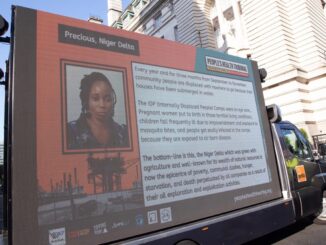
People’s Health Tribunal Finds Shell and Total Energy Guilty of Harming African Communities
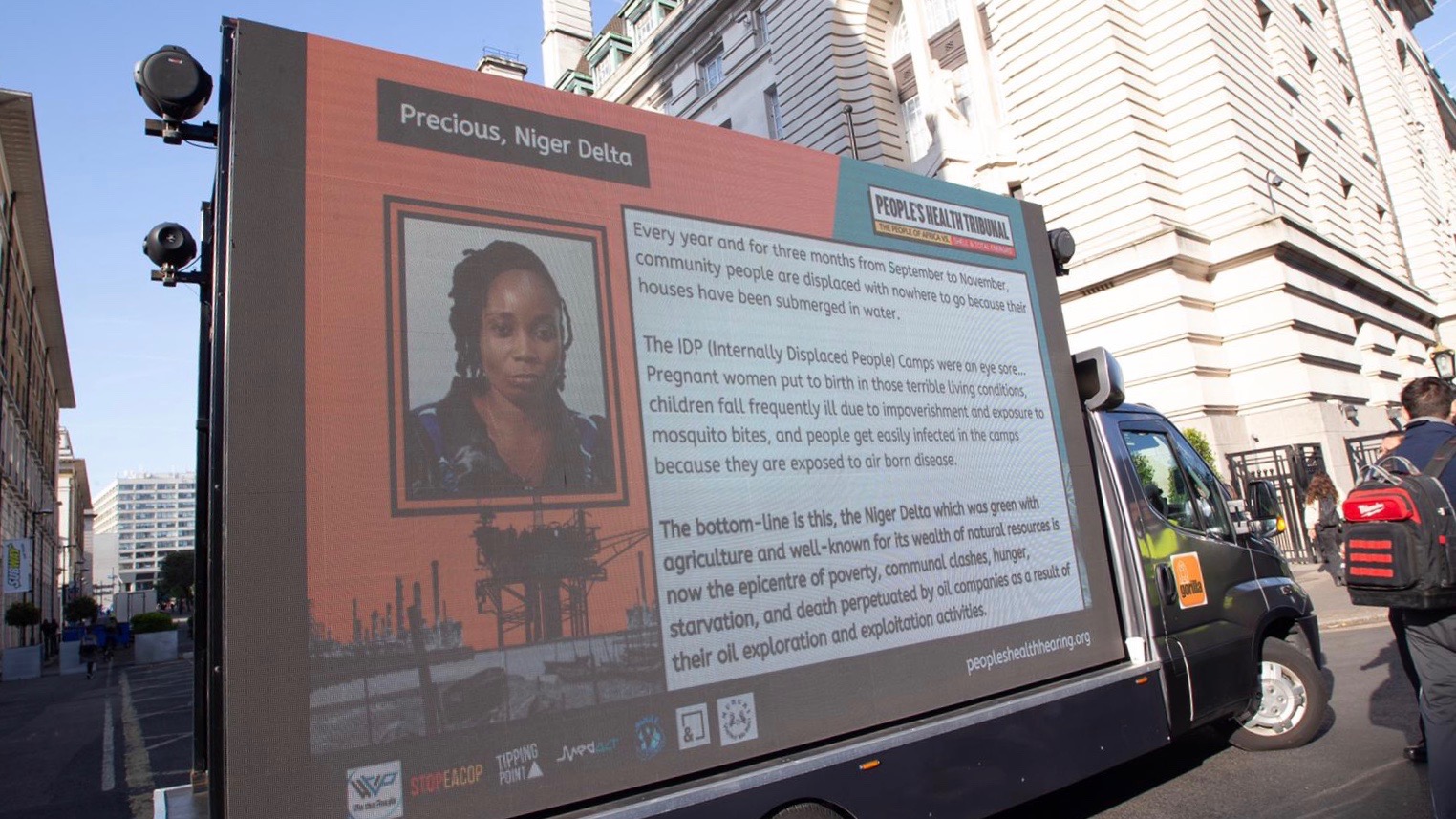
This article originally appeared in People’s Dispatch.
A panel of environmental and human rights activists acted as judges in a People’s Health Tribunal organized by African communities impacted by the operations of extractive corporations Shell and Total Energy. Supported by organizations like Medact, We the People, the People’s Health Movement, #STOPEACOP, and others, they found the corporations guilty of harming the health of people across Africa. Nnimmo Bassey, Jacqueline Patterson, Kanahaus Manuel, and Dimah Mahmoud condemned Shell and Total’s activities, stating that they were “extremely harmful to the livelihoods, health, right to shelter, quality of life, right to live in dignity, quality of environment, right to live free of discrimination and oppression, right to clean water, and right to self-determination.”
This edition of the People’s Health Tribunal was built as activists witnessed extensive greenwashing by the oil and gas industry at COP 27 in Egypt last year. In response, they became even more determined to support the struggles of communities in Africa who are affected by the corporations who attempted to gaslight the public at COP 27.
However, governments in the Global North, where most extractive corporations have their headquarters, still choose to ignore the destruction caused by these industries. In 2022, Shell made a profit of $40 billion, while Total Energy ended the year with US$36 billion in profits. These profits came at the expense of the health and lives of people living in regions where these corporations operate.
Uprooting Set the Ground for Total’s LNG Operations in Mozambique
Decades of exploitation of African land have resulted in devastating consequences, including air pollution, water contamination, deforestation, violence, land grabbing, and forced migration. People in the Niger Delta and Mozambique experience these things daily. Omar Elmawi, who provided an overview of Total’s impact on Mozambique communities, emphasized that in the current situation, “everyone loses, except Total.” Elmawi said he believed that African countries must take control of their own resources and development to make sure that justice is restored.
In Mozambique, Total Energy’s plan to construct an onshore liquefied natural gas (LNG) facility led to the displacement of hundreds of families dependent on farming. Total’s plans also decimated traditional fishing activities, leaving people destitute. Instead of providing the uprooted communities with adequate living conditions and compensation, the company’s plan resulted in people being left without shelter, living in refugee camps, and exposed to violence.
At the same time, pointed out Elmawi, the company was not shying away from tax evasion, bleeding even more resources out of the country and leaving Mozambique without necessary means to build essential infrastructure.
Similar experiences were echoed by activists from Uganda and South Africa, who bore witness to the baleful behavior of Total Energy and Shell in the face of the communities which they so violently entered. The testimonies also highlighted the environmental impacts being shouldered by the same communities, as floods and storms regularly devastate local food production.
Shell Operations in the Niger Delta
Shell has been furiously extracting resources in the Niger Delta for over 60 years, attracting more companies to exploit the region due to its rich reserves. Videos from villages in the Niger Delta clearly show oil contamination of water sources, while Shell ignores the grievances raised by the communities. With Shell’s arrival, people’s health deteriorated, in addition to the environmental devastation caused by oil and gas extraction. People began suffering from previously uncommon diseases, including blindness, respiratory problems, and kidney disease, according to one of the testimony-givers.
However, the people of the Niger Delta aren’t asking for charity or pity; they are determined to fight for justice and see Shell restore the land it has devastated. In the light of that, Shell’s announcement of divesting from operations in the Niger Delta is seen as inadequate by community members. They view it as an attempt to evade responsibility for the damage caused over the years. After all, they pointed out, Shell would not be giving up on their business—they would be simply selling their assets to someone else.
The judges stressed the need to establish infrastructure for a reparative justice process to achieve true reparation for affected communities. They also called for Shell and Total Energy to halt all plans for expanding existing fossil fuel extraction sites, implement a permanent moratorium on exploring new sites, and cease supporting violence against communities through military, paramilitary groups, or private security forces.
In order to achieve that, it is necessary to constantly bear witness about the destruction caused by extractive corporations. By doing that, the people who spoke about their experiences during the People’s Health Tribunal showed extreme courage and deserved respect, said Nnimmo Bassey. “Staying alive and speaking out is the best we can do,” he said.
People’s Health Dispatch is a fortnightly bulletin published by the People’s Health Movement and Peoples Dispatch. For more articles and to subscribe to People’s Health Dispatch, click here.
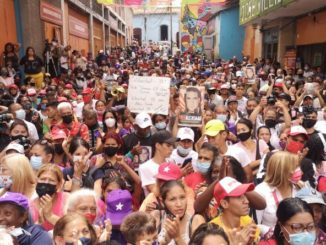
2 Years Since Venezuelan Diplomat Alex Saab Was Abducted for Defying U.S. Sanctions
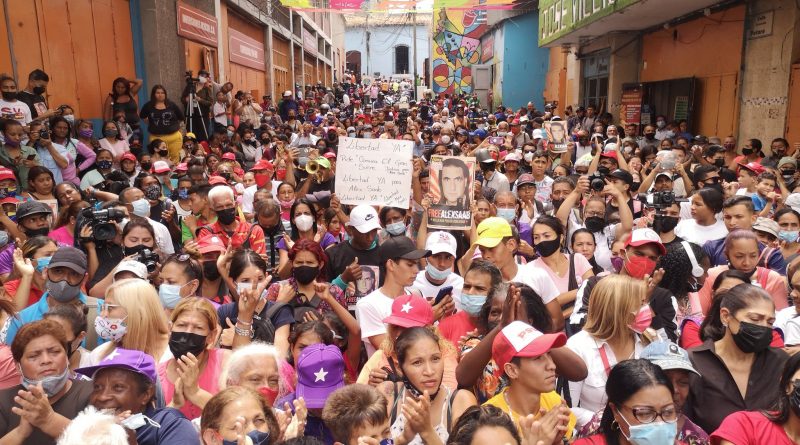
Editor’s Note: This article was originally published by Kawsachun News.
JUNE 12, 2022—Today marks two years since the kidnapping of Venezuelan diplomat Alex Nain Saab, while on a humanitarian mission to Iran, his third mission to the country, to try to alleviate the effects of the U.S. economic warfare against Venezuela.
Saab, an accredited diplomat protected under the Vienna Convention, was abducted in Cape Verde without an arrest warrant or Interpol alert, and was taken to the United States in October of 2021. Cape Verdean authorities kept him arbitrarily imprisoned for 491 days without due process, in violation of the laws of Cape Verde, during which Saab experienced torture.
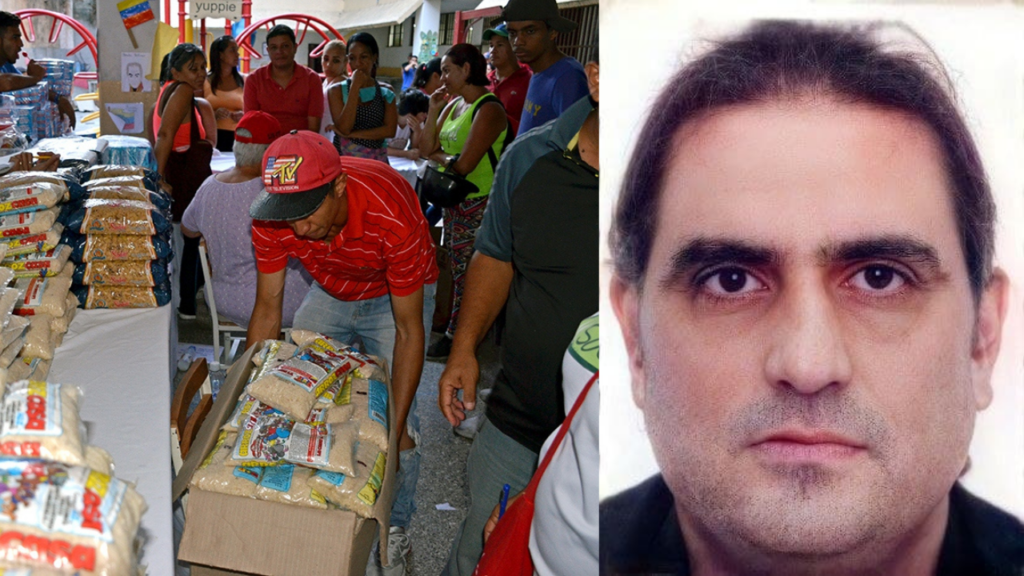
In the book, A Sacred Oath, written by former Trump Defense Secretary Mark Esper, Esper admits that the kidnapping was part of “soft” options to overthrow President Nicolas Maduro.
Esper also admits that Saab’s efforts, as a diplomat and businessman, were always aimed at making the situation of the Venezuelan population more bearable. “According to reports, under the direction of Maduro, Saab was on a special mission to negotiate a deal with Iran for Venezuela to receive more fuel, food and medical supplies . Saab was Maduro’s point man for a long time when it came to crafting economic deals and other transactions that kept the regime afloat.”
Meanwhile, the movement calling for the release of Alex Saab has gone international, and demands for his release were made at the counter-summits both in Los Angeles and Tijuana, during Biden’s Summit of the Americas.
Back in Venezuela, defense of Alex Saab is seen as not only the defense of an individual but as the defense of the sovereign actions of the Bolivarian government and people. The diplomat is also a member of the Venezuelan government delegation in the dialogue process which has taken place in Mexico.
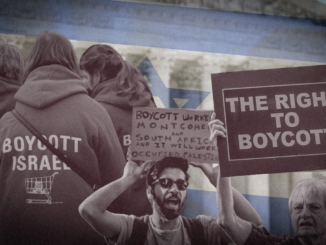
As Anti-BDS Bills Become the Norm, ACLU Takes Free Speech Fight to the Supreme Court
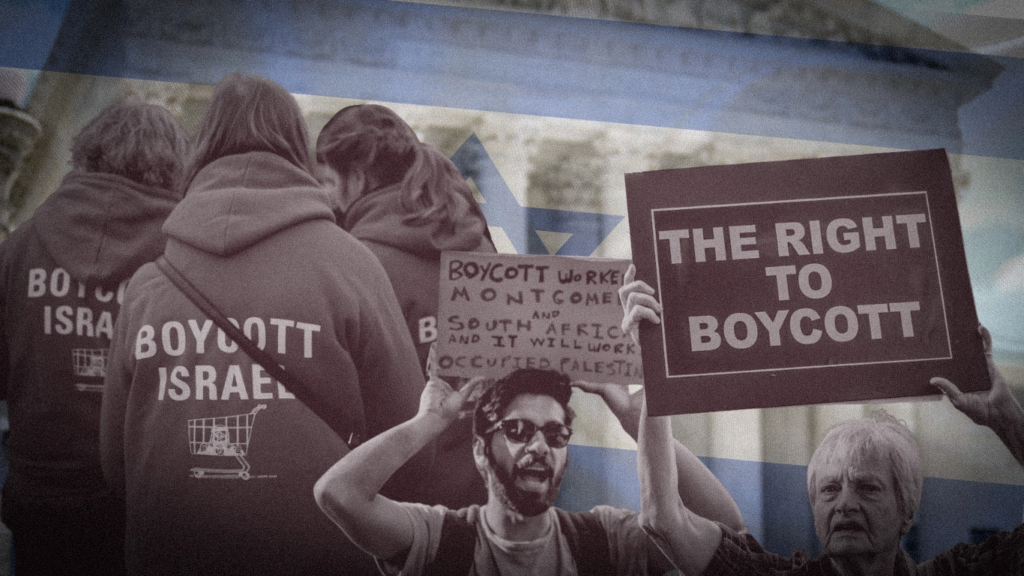
Editor’s Note: This article originally appeared in MintPress News.
However, the recent court ruling determined boycotts are not expressive conduct and instead related to commercial activity and therefore the state can regulate such actions.
“It only prohibits economic decisions that discriminate against Israel,” Judge Jonathan Kobes, who was appointed by former President Donald Trump, wrote in the court’s opinion. “Because those commercial decisions are invisible to observers unless explained, they are not inherently expressive and do not implicate the First Amendment.”
“By declaring Arkansas’ Anti-BDS Law to be constitutional, the court has tacitly endorsed a Palestine-exception to the First Amendment,” Council on American Islamic Relations (CAIR) National Litigation Director, Lena Masri, said in a statement.
In 2018, The Arkansas Times sued the state over its Israel boycott law after refusing to sign the pledge. Originally, Arkansas Times publisher Alan Leveritt lost in District Court but won when he appealed to the Eighth Circuit Court. The state then appealed to the full appeals court and was granted a rehearing.
The American Civil Liberties Union, which represented The Arkansas Times, confirmed it plans to appeal to the Supreme Court. Brian Hauss, the ACLU’s chief litigator on the case, said in a statement that the court’s decision “misreads Supreme Court precedent and departs from this nation’s longstanding traditions.” “It ignores the fact that this country was founded on a boycott of British goods and that boycotts have been a fundamental part of American political discourse ever since,” Hauss said.
Breaking news: The Eighth Circuit Court of Appeals ruled today that boycotts are not protected by the First Amendment. @ACLU has confirmed it'll take the case to the Supreme Court, with huge implications for free speech in America.🧵
— Julia Bacha (@juliabacha) June 22, 2022
Leveritt, who is not participating in a boycott of Israel, told MintPress News that, as a matter of free speech, he wouldn’t sign the pledge.
“No media protected by the First Amendment in this country should take a political position in return for advertising,” Leveritt said. “This is America. The government doesn’t dictate to us what we say and do and think, so that’s why we’re fighting it.”
A clause in the law mandates contractors who do not sign the pledge must then reduce their fees by 20%, which Leveritt said has severely hurt the publication’s finances.
Israeli Government Influencing U.S. Laws
Bills targeting the Palestinian-led Boycott, Divestment and Sanctions movement have spiked in recent years, according to Palestine Legal, an organization protecting the rights of pro-Palestine activists.
As detailed in the documentary, “Boycott”, the Israeli Ministry of Strategic Affairs established the propaganda project, Concert, as a public benefit corporation in order to circumvent U.S. laws on foreign interference. Concert’s primary purpose is to quell growing support for the BDS movement worldwide.
Through Concert, Israel has been able to funnel millions of dollars to organizations that would then lobby for these anti-BDS bills. Christians United for Israel — one of the main advocates for pro-Israel legislation — received $1.3 million from the Israeli government. Other groups include Eagle’s Wings, Hasbara Fellowships, America-Israel Friendship League, and the Israel Allies Foundation.
How the Supreme Court May Rule
If the Arkansas case does reach the Supreme Court, opponents of anti-BDS legislation like CAIR are optimistic the recent appeals court decision will be overturned.
“We realized the Supreme Court is not always a friend of civil rights, but the Eighth Circuit is very conservative, far more conservative than the Supreme Court even,” Justin Sadowsky, trial attorney with CAIR, said. “We’re very hopeful that the Supreme Court, which has often been champions of the First Amendment, will take a more nuanced look at it.”
CAIR’s deputy executive director, Edward Ahmed Mitchell, agreed with this sentiment. He noted that most of the Supreme Court justices take an originalist approach when interpreting the law, meaning they consider the original text of the constitution and apply it to modern scenarios.
“If they really look at what the constitution says — the plain meaning of it — and then also the history of it as originalists tend to do, then they have to rule that these laws are an unconstitutional violation of the free speech of the American people,” Mitchell told MintPress News.
Yet Alison Weir, founder and executive director of the independent research institute, If Americans Knew, outlined the Supreme Court’s pro-Israel influences – something that could lead to a less favorable ruling.
Weir explained in a recent article how the Supreme Court has a history of handing down decisions related to Israel that have changed longstanding U.S. traditions.
These included a 1967 ruling which sided with an Israeli citizen and overturned a ban on dual citizenship and a decision in 1998 that handed the Israel lobby’s flagship organization, the American Israel Public Affairs Committee, a victory over allegations the group violated federal election laws.
These decisions can be attributed to Israel partisans on the court like former Justices Abe Fortas and Stephen Breyer. Today, the court is still packed with Israel loyalists. Kentanji Brown Jackson, Amy Coney Barrett, and Brett Kavanaugh all have pro-Israel influences hidden in their education and career beginnings. Weir surmised Justice Elena Kagan may also pose a potential problem, given her love for Israel and her admiration for the country’s former Supreme Court president, Aharon Barak.
Setting a ‘Dangerous Precedent’
Other versions of the boycott law have passed in 33 states since 2016. Several U.S. residents have challenged these laws in recent years — in Texas, Georgia, Arizona, and Kansas — suing their states for violating their First Amendment rights and winning. But Arkansas is an outlier. Leveritt fears that if he loses in the Supreme Court, this could overturn favorable rulings in lower courts as well.
But it is not just Israel boycotts that are under threat. Boycotts, in general, appear to be at risk in the U.S. “In upholding Arkansas’ anti-BDS law, the court refused to confront the reality that these laws are part of an effort to shield Israel from accountability,” Palestine Legal said in a statement. “Given the proliferation of anti-boycott laws targeting other social justice movements, this decision sets a dangerous precedent for anyone interested in seeking social, political, or economic change.”
The American Legislative Exchange Council (ALEC), which has been instrumental in passing anti-BDS laws across the country, is now targeting financial firms for divesting from the fossil fuel industry.
The group works with corporate lobbyists and Republican state legislators to author legislation. In 2021, ALEC drafted the Energy Discrimination Elimination Act, requiring companies of 10 or more full-time employees to provide written verification it doesn’t boycott fossil fuel businesses before entering into a government contract. So far, Oklahoma, North Dakota, and Texas have signed similar legislation into law. Texas has also passed legislation prohibiting contracts with companies that boycott the firearms industry. ALEC is funded primarily by Koch Industries and a host of other energy and utility companies.
Other states are also using the anti-boycott model to target politically-charged industries. Alaska, Arizona, Idaho, Indiana, Kansas, Kentucky, Louisiana, Minnesota, Missouri, Ohio, Oklahoma, Oregon, South Carolina, South Dakota, Utah, West Virginia and Wisconsin all have drafted anti-BDS legislation.
Julia Bacha, director of the documentary “Boycott”, described the rapid trajectory of anti-BDS legislation in the U.S. in a Twitter thread following the Eighth Circuit Court ruling. “When we started production, the risk that the anti-BDS bill would be used as a template was still theoretical. By the time we locked-picture, it was a reality,” she wrote.
But she also cautions U.S. residents to not solely pin the blame on Republicans over anti-BDS bills becoming the norm, writing:
Beware of press coverage that points the finger at Republicans for stripping away our rights without recognizing that Democrats were complicit in opening the pandora’s box when they overwhelmingly supported anti-BDS bills. There’s no First Amendment Exception to Palestine and this is as good [sic] time as any for the Democratic Party to learn this lesson, before irreparable damage to our rights in America is done.”
Thus, if certain pro-Israel and pro-fossil fuel advocates get their way, a fundamental right to protest will be removed from U.S. residents.
Jessica Buxbaum is a Jerusalem-based journalist for MintPress News covering Palestine, Israel, and Syria. Her work has been featured in Middle East Eye, The New Arab and Gulf News.
